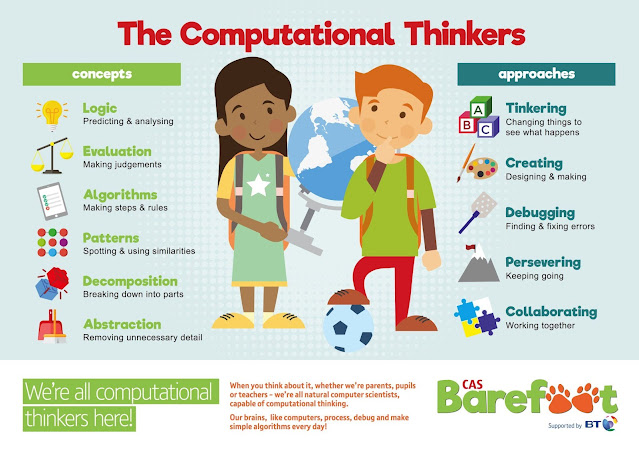CT Things that came up today
- Hiberworld which I thought was a nice 3D example of a template based game generator.
- HeroForge - looked like an interesting 3D character creator app
Teachers Pay Teachers
- $5 Minecraft Pixel Art worksheets - Image Binary Representation -https://www.teacherspayteachers.com/Product/Minecraft-themed-BINARY-BUNDLE-Simple-Binary-Encoding-Worksheets-Project-6401524
- $10 Minecraft Edu posters and Lesson Plans https://www.teacherspayteachers.com/Product/Minecraft-Education-Introduction-Unit-6138907
ECE CT etc.
Previous CT PLD
CT Professional Development with UC
I have enrolled in Edem626 with University of Canterbury (UC). At the start of this course we discussed Computational Thinking (CT).
UC Course Material
I will post some of the content here for your information.
There are two 12-minute videos prepared by Tim on pre-NCEA and NCEA Computer Science in NZ; you can watch the one relevant to the level you teach, although both will be useful for all teachers since you may want to know what students are being prepared for, or what preparation they are likely to have had once the changes settle in.
- Video on PO1-5 (pre-NCEA)
- Video on NCEA standards
Links used in the videos are:
The main reading for this segment is one of your readings from week 1:
Curzon, P., Bell, T., Waite, J., & Dorling, M. (2019). Computational thinking. In S. Fincher & A. Robins (Eds.), The Cambridge Handbook of Computing Education Research (pp. 513–546). Cambridge University Press.
An open access version of the chapter is available online (free).
Links used in this week's session are:
- The CS Field Guide chapter on Data Representation, where many of these ideas are explained
- The online binary card activity
- The online binary card activity with more digits and fractional bits (you can change the numbers in the URL to get more bits!)
- The binary card activity unplugged
- The RGB mixer (for 24-bit colour, i.e. 3x8 bits)
- Comparing images with different numbers of bits per pixel
- Interactive pixel viewer (you can drop your own photos into this viewer)
- Unplugged activity on binary representation
We talked about what computation is; you can find a bit more about it from the reading for this module - section 17.1.1 addresses the question of what computation is, but also search the document for mentions of "Turing" for concepts around what a formal definition of computation is. Section 17.1.5 ("An Evolving Definition") talks about how there isn't a fixed definition in use.
We also talked a lot about curricula outside NZ; here are some links to approaches to Computational Thinking from overseas
- Computing at School
- CAS on Computational Thinking (CT) - UK Computing At School community
- ISTE and CT - ISTE is largely based in the USA with roots in ICT/e-learning
- ISTE and CSTA operational definition of CT
- Google's Exploring CT
- Google CT overview
- CT in the New Zealand Curriculum (NZC)


No comments:
Post a Comment